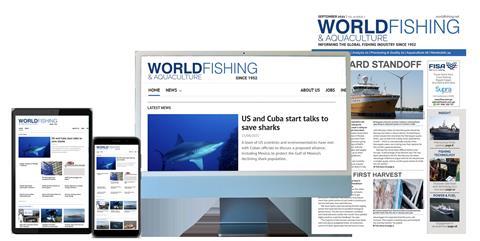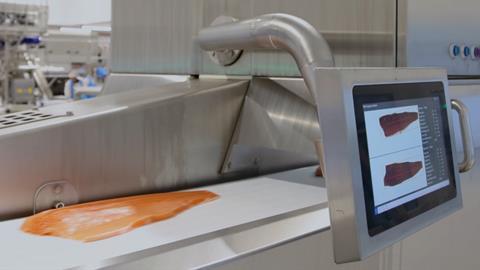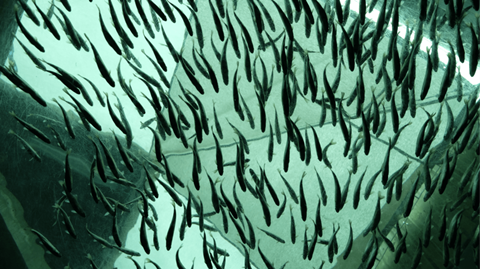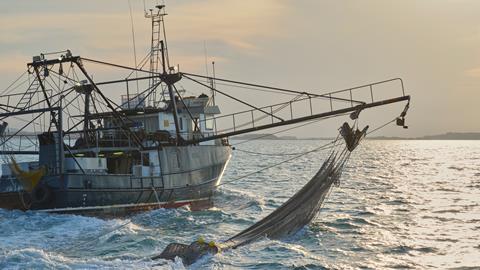- News
- Subscribe

Get full access to World Fishing & Aquaculture content
Including the digital magazine, full news archive, special reports, webinars and articles on innovations and current trends in the commercial fishing and aquaculture industries.
- Expert analysis and comment
- Unlimited access to in-depth articles and premium content
- Full access to all our online archive
Alternatively REGISTER for website access and sign up for email alerts
- Industry Database
- Events
Icelandic Fisheries Exhibition
Fish Waste For Profit Conference


The largest commercial fishing exhibition in the North Maximise return on investment from potentially discarded parts of the catch Visit the IceFish Website Visit the Fish Waste for Profit Website
- Special Reports
By-Product Solutions
Smart, Connected Seafood Processing
Land-Based Aquaculture Technology
Greener Fishing
January-February 2025 March-April 2025 July-August 2025 November-December 2025 



Cutting waste and maximising value Robotics, analytics software and other Industry 4.0 technologies are helping to scale-up productivity New production systems are escalating the industry’s contribution to global food security Fisheries are becoming increasingly responsible and sustainable thanks to new technologies and initiatives Read More Read More Read More Read More
‘AI will transform seafood’

By leveraging AI, seafood can address its biggest challenges and ensure a more sustainable future, insists tech entrepreneur Chris van der Kuyl
Artificial intelligence – or AI – is perfectly aligned with the seafood industry’s ambition to help sustainably feed a global population hurtling towards 10 billion people by 2050, and only those ventures that incorporate data-driven innovations across their operations can address challenges and hope to prosper, according to Chris van der Kuyl of 4J Studios Ltd (the developers of the Minecraft game) and Principal at Chroma Ventures.
Delivering the keynote address at the 2024 edition of the Responsible Seafood Summit, this year held in St Andrews, Scotland, Van der Kuyl said: “We live in a time of the fastest pace of change in human history, yet it will never be this slow again.”
He told the conference that in 1965, Gordon Moore, one of the founders of Intel, stated that for the next decade, the density of silicon chips would roughly double every 18 months. He said that while observers at the time thought Moore’s prediction was wildly optimistic, it transpired that it wasn’t just right for that time period, but it still holds firm today, almost 60 years later.
“With the rise of technology solutions applied to the design and manufacturing of silicon, this piece of change will only come faster and faster. We’ve witnessed an unprecedented acceleration of pace of change, one that shows no signs of slowing. Over the past 60 years, ‘Moore’s Law’, as it’s known, has driven exponential growth in technology’s capabilities. And now this acceleration is poised to increase even further.
“The future promises even faster innovation – reshaping industries and societies at speed we’ve never before experienced. And this can be both exciting and utterly terrifying and equal measure.”
Noting that it took less than two decades from the launch of the worldwide web in the mid-1990s for e-commerce “to become all pervasive”, Van der Kuyl pointed out that the world’s largest and most successful companies are now based on innovation and knowledge rather than on traditional assets or industries.
“We’re at a point where no business will thrive, or possibly even survive, if it doesn’t embrace all the opportunities that technology has to offer. Today, that pace of change [and] ushering in of disruptive business models is happening in the space of a year or two, and in some cases, a matter of months.”
AI is a discipline that Van der Kuyl professes a lot of love for, but he also highlighted that AI tools such as ChatGPT, DeepMind and protein folding are not the result of new science, but of science that’s “finally been made useful” by Moore’s Law.
“The science has existed for decades,” he said. “Enormous resources in cloud computing have meant that people all over the world have access to almost limitless computing power at the click of a mouse.”
Continue this article…
Already subscribed? SIGN IN now

Register for a FREE one-month trial to continue this article
Want to read more before deciding on a subscription? It only takes a minute to sign up for a free account and you’ll get to enjoy:
- Weekly newsletters providing valuable news and information on the commercial fishing and aquaculture sector
- Full access to our news archive
- Live and archived webinars, podcasts and videos
- Articles on innovations and current trends in the commercial fishing industry
- Our extensive archive of data, research and intelligence
Get more free content sign up today
Ready to subscribe? Choose from one of our subscription packages for unlimited access!


